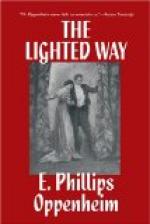“Tell me,” she inquired, “has my husband sent you here?”
Arnold admitted the fact.
“I have a message,” he replied.
“For Mr. Rosario?”
“For Mr. Rosario.”
“You have not seen anything of him yet, then?” she asked quickly.
“He has not been here,” Arnold assured her. “I have kept my eyes glued upon the door.”
“Tell me the message quickly,” she begged.
Arnold did not hesitate. Mr. Weatherley was his employer but this woman was his employer’s wife. If there were secrets between them, it was not his concern. It seemed natural enough that she should ask. It was certainly not his place to refuse to answer her question.
“I was to tell him that on no account was he to lunch here to-day,” Arnold said. “He was to go instead to the grill room at Prince’s in Piccadilly, and remain there until two o’clock.”
Mrs. Weatherley made no remark. Her face was emotionless. Closely though he was watching her, Arnold could not himself have declared at that moment whether indeed this message had any import to her or not.
“I find my husband’s behavior exceedingly mysterious,” she said thoughtfully. “I cannot imagine how he became concerned in the matter at all.”
“I believe,” Arnold told her, “that some one telephoned Mr. Weatherley this morning. He was asked for privately several times and he seemed very much disturbed by some message he received.”
“Some one telephoned him,” she repeated, frowning. “Now I wonder who that person could be.”
She sat quite still for a moment or two, looking through the glass-paneled door. Then she shrugged her shoulders.
“In any case,” she declared, “I am here to lunch and I am hungry. I will not wait for Mr. Rosario. May I sit here?”
He called a waiter and the extra place was very soon prepared.
“If Mr. Rosario comes,” she said, “we can see him from here. You can then give him your message and he can please himself. I should like some Omelette aux Champignons, please, and some red wine—nothing more. Perhaps I will take some fruit later. And now, please, Mr. Arnold Chetwode, will you listen to me?”
She undid her ermine cloak and laid aside her muff. The collection of costly trifles which she had been carrying she threw carelessly upon the table.
“Last night,” she continued, softly, “we agreed, did we not, to be friends? It is possible you may find our friendship one of deeds, not words alone.”
“There is nothing I ask for more sincerely,” he declared.
“To begin with, then,” she went on, “I do not wish that you call me Mrs. Weatherley. The name annoys me. It reminds me of things which at times it is a joy to me to forget. You shall call me Fenella, and I shall call you Arnold.”
“Fenella,” he repeated, half to himself.
She nodded.
“Well, then, that is arranged. Now for the first thing I have to ask of you. If Mr. Rosario comes, I do not wish that message from my husband to be delivered.”




